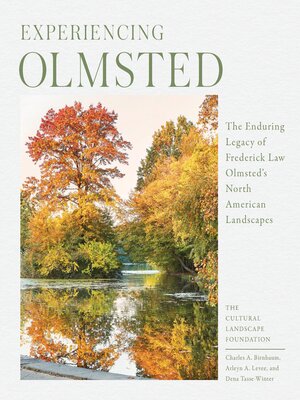Experiencing Olmsted
ebook ∣ The Enduring Legacy of Frederick Law Olmsted's North American Landscapes
By The Cultural Landscape Foundation

Sign up to save your library
With an OverDrive account, you can save your favorite libraries for at-a-glance information about availability. Find out more about OverDrive accounts.
Find this title in Libby, the library reading app by OverDrive.



Search for a digital library with this title
Title found at these libraries:
| Library Name | Distance |
|---|---|
| Loading... |
200 Iconic Landscapes That Define North America
Frederick Law Olmsted is the father of American landscape architecture. His firm, and the successor firms that sprung from it, worked through the nineteenth and twentieth centuries to shape some of our most beloved green spaces, including national, state, and city parks, suburban neighborhoods, and academic campuses. He is most famous for creating New York’s Central and Prospect Parks, Stanford University’s campus, and the Capitol Grounds. What is less known and surprising about his legacy is that he worked widely across North America.
By highlighting 200 iconic landscapes, many of which are still open to the public today, Experiencing Olmsted brings a fresh approach to the firms’ work and philosophy. It highlights not only grand city parks, but also other public venues born out of a desire for social equity. Olmsted was an early voice for parks as democratic spaces that could be reached on foot by a large percentage of any city’s populace. He viewed parks as restorative places—what he termed “the lungs of a city.” Brimming with contemporary and archival photography as well as original drawings and plans, this truly remarkable record brings these places to vivid life.
Frederick Law Olmsted is the father of American landscape architecture. His firm, and the successor firms that sprung from it, worked through the nineteenth and twentieth centuries to shape some of our most beloved green spaces, including national, state, and city parks, suburban neighborhoods, and academic campuses. He is most famous for creating New York’s Central and Prospect Parks, Stanford University’s campus, and the Capitol Grounds. What is less known and surprising about his legacy is that he worked widely across North America.
By highlighting 200 iconic landscapes, many of which are still open to the public today, Experiencing Olmsted brings a fresh approach to the firms’ work and philosophy. It highlights not only grand city parks, but also other public venues born out of a desire for social equity. Olmsted was an early voice for parks as democratic spaces that could be reached on foot by a large percentage of any city’s populace. He viewed parks as restorative places—what he termed “the lungs of a city.” Brimming with contemporary and archival photography as well as original drawings and plans, this truly remarkable record brings these places to vivid life.







